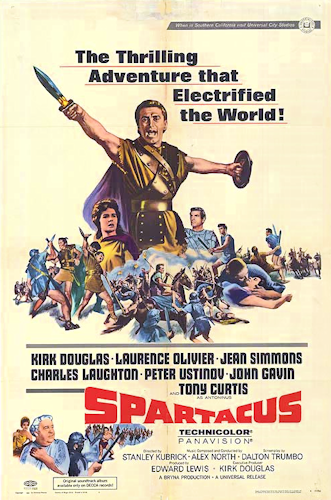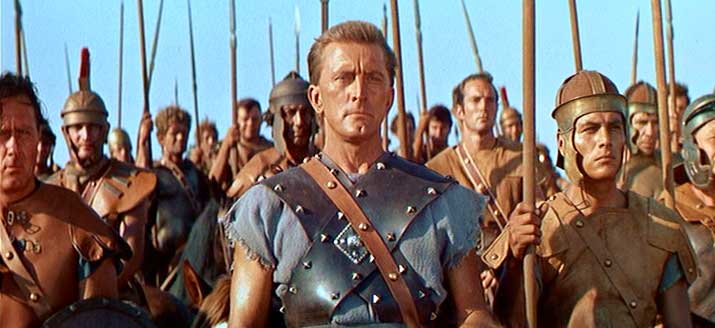 #374- Spartacus (1960)
#374- Spartacus (1960)Starring: Kirk Douglas, Laurence Olivier, Tony Curtis
Directed by: Stanley Kubrick
Plot Summary: In 1st Century BC, a proud and courageous slave named Spartacus is sold to be a gladiator. He proves to be an impressive warrior and forms a strong relationship with serving woman named Varinia. When she is sold to Roman senator Crassus, Spartacus is taunted and leads a riot with the rest of the slaves. They flee and appoint Spartacus as chief of the fugitives and they pillage their way to prosperity in order to reclaim their lives. Spartacus gains many allies along the way, including Antoninus, a former slave of Crassus who fled after his master attempted to seduce him, and Varinia, who reunites with Spartacus and they start a family together. As Spartacus and his army continue to defeat all obstacles that are put in front of them, Crassus and the Roman Senate use bribes and underhanded tactics to leave Spartacus and his army vulnerable to their attacks. Paranoid of a takeover from Spartacus, the Senate puts full power in the hands of Crassus. With all opposition against them, Spartacus convinces his troop that if they are going to die, they should die fighting because it proves they are more than slaves. It proves that they are human beings and individuals.
Of all the films Stanley Kubrick has done, Spartacus might seem a bit left field for his style. Heck, I had known about the movie my entire life and only maybe last year did I actually find out he directed it. With a cast including film legends Laurence Olivier, Tony Curtis, and Kirk Douglas (who worked with Kubrick in Paths of Glory), along with a 3 hour epic narrative, how could it not work within Kubrick's style? I'll tell you how, because even though he was directing the movie, he didn't have as much creative control as he'd like. At the end of the day, he was replacing a director who was fired after one week of filming, and Universal Pictures had final artistic control of the project. With that in mind, does Spartacus feel like an authentic and genuine Kubrick movie? Does it at least feel like half of one? And if it only feels like half a Kubrick movie, or not at all, is it worth watching? That's what we're here to find out.
 Kirk Douglas once again stars in a Kubrick film, this time by playing the titular character of Spartacus. Often times in gladiator films, main protagonists have the same character tropes, from Ben-Hur to Gladiator, and Spartacus is no exception. He's selfless and courageous, and knows what needs to be done to achieve his objectives. Do I think anyone could have played him? It's possible, but it can't be denied that this is one of Kirk Douglas's most notable movie roles. Personally, I liked him more in Paths of Glory, since Col. Dax was a bit more complex than Spartacus as a main character. It's still a pretty powerful and important performance to watch, and Douglas more than certainly holds his own as the lead.
Kirk Douglas once again stars in a Kubrick film, this time by playing the titular character of Spartacus. Often times in gladiator films, main protagonists have the same character tropes, from Ben-Hur to Gladiator, and Spartacus is no exception. He's selfless and courageous, and knows what needs to be done to achieve his objectives. Do I think anyone could have played him? It's possible, but it can't be denied that this is one of Kirk Douglas's most notable movie roles. Personally, I liked him more in Paths of Glory, since Col. Dax was a bit more complex than Spartacus as a main character. It's still a pretty powerful and important performance to watch, and Douglas more than certainly holds his own as the lead.Douglas isn't the only powerful performance in the film however, as many big actors from the time come together to round out the supporting cast. One in particular I was paying attention to was Laurence Olivier as the main antagonist Crassus. Considered one of the greatest actors of all time, I expected to be wowed by Olivier, but maybe this wasn't the greatest introduction to him. That's not to say he doesn't command his scenes (because he does), but there is an elephant in the room with his character. A big GAY (admittedly bisexual) elephant that comes out of nowhere and isn't brought up often. That's not to say I dislike homosexuality, and I understand bisexuality was a thing back then, but it was distracting because it was only present for maybe 2 or 3 scenes in a 3 hour movie. Another character played by a big name actor was Antoninus, played by Tony Curtis. This was miles different from what I have seen from him (The Great Race and Some Like It Hot), but I thought he did a great job in scenes that allowed him to work off both Douglas and Olivier. He's a sidekick character, but he plays it really well.
The love interest of Spartacus is Varinia, played by Jean Simmons. She's your basic love interest, but her love for Spartacus is strong and it gradually grows throughout the film, like you would imagine love to grow. They start with a normal friendship and it blossoms throughout and they evolve as a couple together. And the chemistry between Douglas and Simmons is believable, so kudos to them. Interestingly enough, the only acting performance to win an Oscar was Peter Ustinov as Batiatus. I enjoy the character of Batiatus because it allows Ustinov to run the gamut of emotions and motivations for an individual character. Early on in the film, Batiatus is your typical, greedy, businessman-type character. He specializes in buying and training slaves to be gladiators. My favorite scene of his is when he is trying to sell gladiators to Crassus, he is underselling great warriors like Spartacus and is trying to pawn off smaller and weaker gladiators as greater fighters. Is it because he values Spartacus as a person? No. It's because he's a quality businessman and wants to make a product off his weaker commodities. I really dig it. By the end of the film, he develops into a more compassionate and helpful character for Spartacus and his allies. It's a really good character that stands out as one of my favorite parts of the film.
 My absolute favorite part of Spartacus, however, is the large amount of atmosphere, most present in the action scenes. The gladiator battles are one on one, so they not only are intimate between characters, but Kubrick puts up so much scenery that the audience is also able to absorb the atmosphere and feel like they are in the middle of a Roman coliseum watching real gladiators fight. Another great scene involves Spartacus and his army of slaves battling the Roman army. The amount of extras they used (no use of CGI here, those people are all real), and the intricate camera angles really made this epic war between armies feel like something Kubrick could create. And give props to the stunt team, the stunts draw that fine line between overly choreographed and intense realism. When they fight with such finesse that it looks effortless, it's more on the overly choreographed, but when they bring FIRE into the mix, there's the realism. These scenes should really entertain any fan of action movies, as many of them still hold up to this day.
My absolute favorite part of Spartacus, however, is the large amount of atmosphere, most present in the action scenes. The gladiator battles are one on one, so they not only are intimate between characters, but Kubrick puts up so much scenery that the audience is also able to absorb the atmosphere and feel like they are in the middle of a Roman coliseum watching real gladiators fight. Another great scene involves Spartacus and his army of slaves battling the Roman army. The amount of extras they used (no use of CGI here, those people are all real), and the intricate camera angles really made this epic war between armies feel like something Kubrick could create. And give props to the stunt team, the stunts draw that fine line between overly choreographed and intense realism. When they fight with such finesse that it looks effortless, it's more on the overly choreographed, but when they bring FIRE into the mix, there's the realism. These scenes should really entertain any fan of action movies, as many of them still hold up to this day.The big question about Spartacus is whether or not it feels like a genuine Kubrick film. Even if it does feel like a drag during certain parts, there are many instances that remind of Kubrick's style. He's done grand and epic movies since this (2001: A Space Odyssey and Barry Lyndon come to mind), so it's great to get some experience in filming large scope projects like this one. I know he didn't get the full creative freedom he would've liked for this film, but it is still feels up his alley with how it's filmed and because of how extravagant it can be. Lastly, the film is still enjoyable to watch, so it stands well on its own. People generally associate The Shining, A Clockwork Orange, and 2001: A Space Odyssey more with Kubrick's work and style more than Spartacus, but people still know about the film despite the lack of direct correlation with Kubrick as director. Maybe that's the most telling detail of the film's legacy.
Rating: 3 out of 5 stars
Spartacus is fueled by great acting performances from a very talented cast, and is full of enough action and atmosphere to keep moviegoers coming back from more. It might stand alone without Kubrick's name, but it also proves Kubrick can tackle the epic movie. However, it may be longer than some would like, so I'll just say all movie buffs should rent this one and watch it at least once.
Spartacus and movie images are copyrighted by Universal Pictures
No comments:
Post a Comment